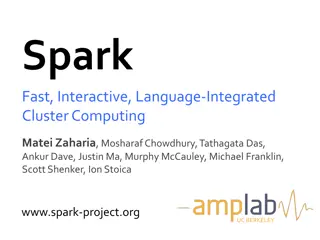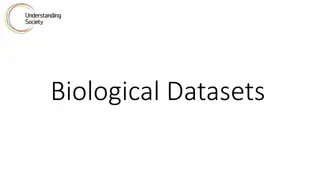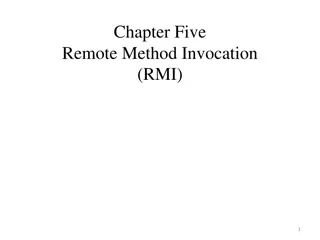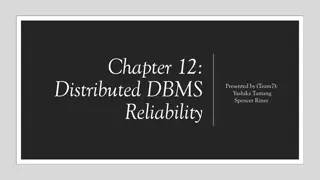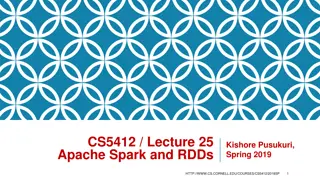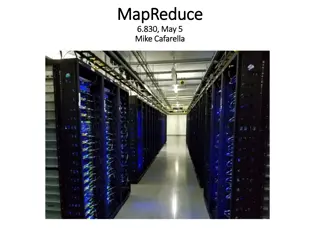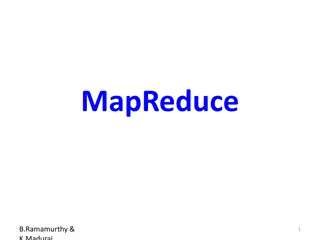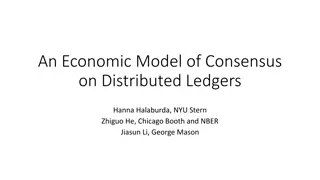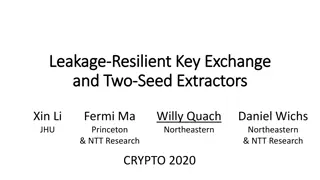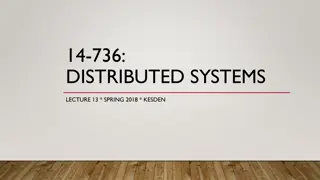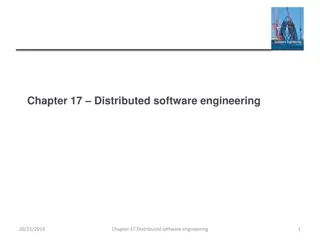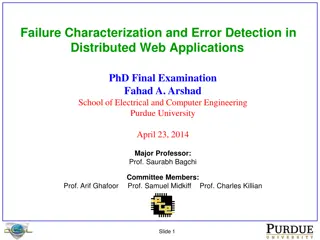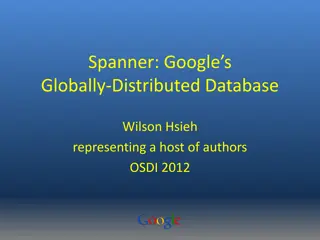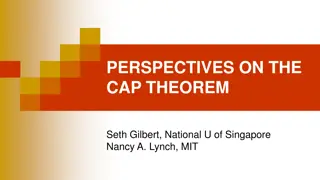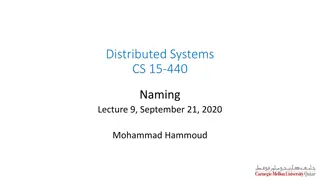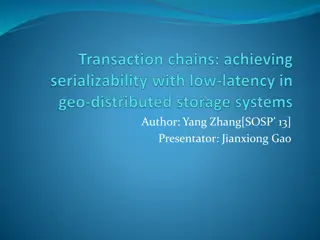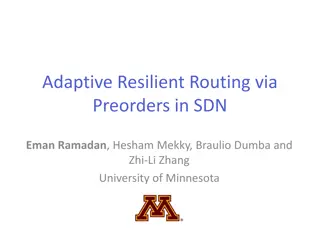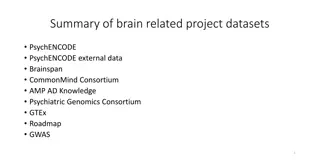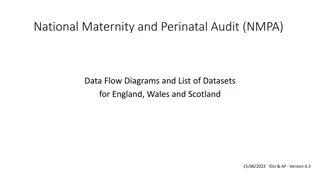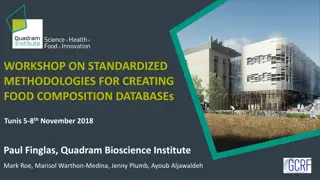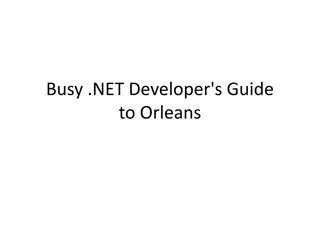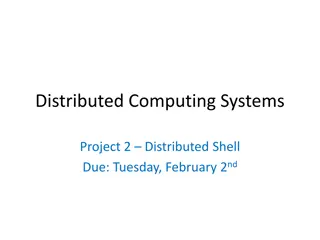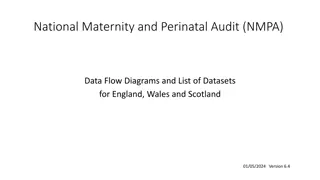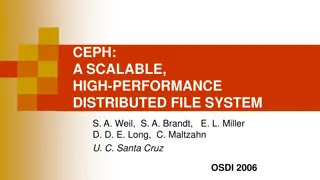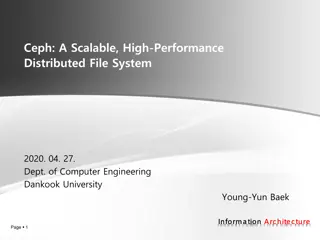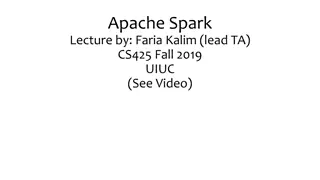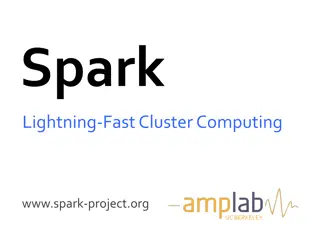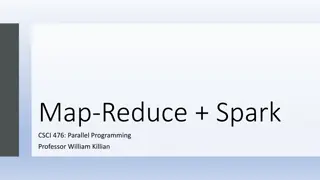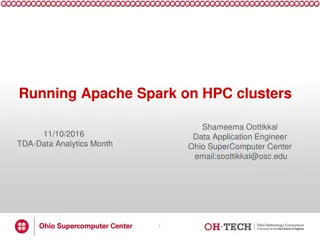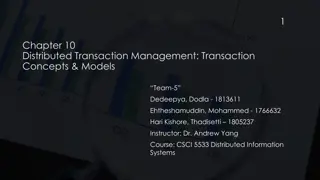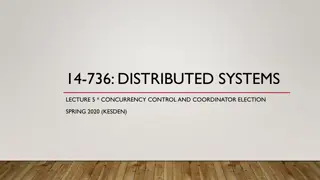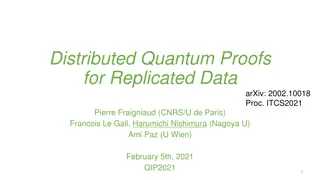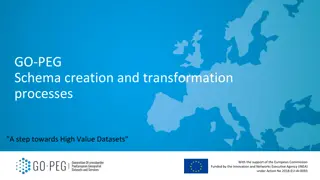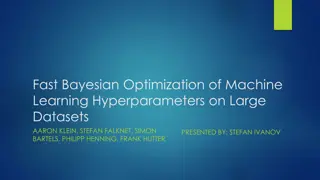Overview of Distributed Systems: Characteristics, Classification, Computation, Communication, and Fault Models
Characterizing Distributed Systems: Multiple autonomous computers with CPUs, memory, storage, and I/O paths, interconnected geographically, shared state, global invariants. Classifying Distributed Systems: Based on synchrony, communication medium, fault models like crash and Byzantine failures. Comp
9 views • 126 slides
Building a Resilient Workforce Key Strategies from HR Consulting Firms in 2024
Building a Resilient Workforce: Key Strategies\nfrom HR Consulting Firms in 2024\nBuilding a resilient workforce has become a priority for organizations aiming to\nthrive in an unpredictable and rapidly changing business environment. HR\nconsulting firms in 2024 are focusing on several key strategie
0 views • 4 slides
Understanding Apache Spark: Fast, Interactive, Cluster Computing
Apache Spark, developed by Matei Zaharia and team at UC Berkeley, aims to enhance cluster computing by supporting iterative algorithms, interactive data mining, and programmability through integration with Scala. The motivation behind Spark's Resilient Distributed Datasets (RDDs) is to efficiently r
0 views • 41 slides
Understanding Biological Datasets and Omics Approaches in Disease Research
Explore the world of biological datasets, lipidomics, genomics, epigenomics, proteomics, and the application of omics in studying biological mechanisms, predicting outcomes, and identifying important variables. Dive into DNA, gene expression, methylation, and genetic datasets to unravel the complexi
0 views • 34 slides
Understanding Parallel and Distributed Computing Systems
In parallel computing, processing elements collaborate to solve problems, while distributed systems appear as a single coherent system to users, made up of independent computers. Contemporary computing systems like mobile devices, IoT devices, and high-end gaming computers incorporate parallel and d
1 views • 11 slides
Understanding Remote Method Invocation (RMI) in Distributed Systems
A distributed system involves software components on different computers communicating through message passing to achieve common goals. Organized with middleware like RMI, it allows for interactions across heterogeneous networks. RMI facilitates building distributed Java systems by enabling method i
1 views • 47 slides
Distributed DBMS Reliability Concepts and Measures
Distributed DBMS reliability is crucial for ensuring continuous user request processing despite system failures. This chapter delves into fundamental definitions, fault classifications, and types of faults like hard and soft failures in distributed systems. Understanding reliability concepts helps i
0 views • 58 slides
Spark: Revolutionizing Big Data Processing
Learn about Apache Spark and RDDs in this lecture by Kishore Pusukuri. Explore the motivation behind Spark, its basics, programming, history of Hadoop and Spark, integration with different cluster managers, and the Spark ecosystem. Discover the key ideas behind Spark's design focused on Resilient Di
0 views • 59 slides
Understanding MapReduce for Large Data Processing
MapReduce is a system designed for distributed processing of large datasets, providing automatic parallelization, fault tolerance, and clean abstraction for programmers. It allows for easy writing of distributed programs with built-in reliability on large clusters. Despite its popularity in the late
0 views • 52 slides
Understanding MapReduce in Distributed Systems
MapReduce is a powerful paradigm that enables distributed processing of large datasets by dividing the workload among multiple machines. It tackles challenges such as scaling, fault tolerance, and parallel processing efficiently. Through a series of operations involving mappers and reducers, MapRedu
7 views • 32 slides
Economic Models of Consensus on Distributed Ledgers in Blockchain Technology
This study delves into Byzantine Fault Tolerance (BFT) protocols in the realm of distributed ledgers, exploring the complexities of achieving consensus in trusted adversarial environments. The research examines the classic problem in computer science where distributed nodes communicate to reach agre
0 views • 34 slides
Distributed Algorithms for Leader Election in Anonymous Systems
Distributed algorithms play a crucial role in leader election within anonymous systems where nodes lack unique identifiers. The content discusses the challenges and impossibility results of deterministic leader election in such systems. It explains synchronous and asynchronous distributed algorithms
2 views • 11 slides
Leakage-Resilient Key Exchange and Seed Extractors in Cryptography
This content discusses the concepts of leakage-resilient key exchange and seed extractors in cryptography, focusing on scenarios involving Alice, Bob, and Eve. It covers non-interactive key exchanges, passive adversaries, perfect randomness challenges, and leakage-resilient settings in symmetric-key
6 views • 35 slides
Overview of Distributed Systems, RAID, Lustre, MogileFS, and HDFS
Distributed systems encompass a range of technologies aimed at improving storage efficiency and reliability. This includes RAID (Redundant Array of Inexpensive Disks) strategies such as RAID levels, Lustre Linux Cluster for high-performance clusters, MogileFS for fast content delivery, and HDFS (Had
0 views • 23 slides
Distributed Software Engineering Overview
Distributed software engineering plays a crucial role in modern enterprise computing systems where large computer-based systems are distributed over multiple computers for improved performance, fault tolerance, and scalability. This involves resource sharing, openness, concurrency, and fault toleran
0 views • 66 slides
Challenges in Detecting and Characterizing Failures in Distributed Web Applications
The final examination presented by Fahad A. Arshad at Purdue University in 2014 delves into the complexities of failure characterization and error detection in distributed web applications. The presentation highlights the reasons behind failures, such as limited testing and high developer turnover r
0 views • 53 slides
Google Spanner: A Distributed Multiversion Database Overview
Represented at OSDI 2012 by Wilson Hsieh, Google Spanner is a globally distributed database system that offers general-purpose transactions and SQL query support. It features lock-free distributed read transactions, ensuring external consistency of distributed transactions. Spanner enables property
0 views • 27 slides
Understanding the CAP Theorem in Distributed Systems
The CAP Theorem, as discussed by Seth Gilbert and Nancy A. Lynch, highlights the tradeoffs between Consistency, Availability, and Partition Tolerance in distributed systems. It explains how a distributed service cannot provide all three aspects simultaneously, leading to practical compromises and re
0 views • 28 slides
Understanding Distributed Hash Table (DHT) in Distributed Systems
In this lecture, Mohammad Hammoud discusses the concept of Distributed Hash Tables (DHT) in distributed systems, focusing on key aspects such as classes of naming, Chord DHT, node entities, key resolution algorithms, and the key resolution process in Chord. The session covers various components of D
0 views • 35 slides
Distributed Database Management and Transactions Overview
Explore the world of distributed database management and transactions with a focus on topics such as geo-distributed nature, replication, isolation among transactions, transaction recovery, and low-latency maintenance. Understand concepts like serializability, hops, and sequence number vectors in ma
0 views • 17 slides
Adaptive Resilient Routing via Preorders in SDN
This research paper discusses the challenges of path-based routing in modern networks and introduces a novel approach called Adaptive Resilient Routing via Preorders in Software-Defined Networking (SDN). The authors emphasize the limitations of traditional routing schemes, the importance of resilien
0 views • 42 slides
Overview of Major Brain Research Datasets and Consortia
This detailed summary provides information on significant brain-related project datasets and consortia, including PsychENCODE, BrainSpan, CommonMind Consortium, AMP-AD Knowledge, and more. Each dataset or consortium focuses on specific areas such as genomics, neuropsychiatric diseases, neurodegenera
0 views • 18 slides
National Maternity and Perinatal Audit (NMPA) Data Flow Overview
The National Maternity and Perinatal Audit (NMPA) collects data extracts from various datasets in England, Wales, and Scotland to improve maternity and perinatal services. The datasets include mortality registers, birth notification datasets, maternity services data sets, and more. The collected dat
0 views • 5 slides
Workshop on Standardized Methodologies for Food Composition Databases
The workshop held in Tunisia aimed to improve national food composition datasets, focusing on countries in the Eastern Mediterranean Region and Africa. Key objectives included identifying existing data status, providing training on data compilation, and generating harmonized datasets for EuroFIR. Th
0 views • 15 slides
Exploring Microsoft Orleans: A .NET Developer's Guide
Dive into the world of virtual actors and distributed system design with Microsoft Orleans, a powerful framework for building scalable and resilient applications in .NET. Learn about key concepts like grains, silos, and virtual actors, and discover how Orleans simplifies the development of complex d
0 views • 37 slides
Distributed Computing Systems Project: Distributed Shell Implementation
Explore the concept of a Distributed Shell in the realm of distributed computing systems, where commands can be executed on remote machines with results returned to users. The project involves building a client-server setup for a Distributed Shell, incorporating functionalities like authentication,
0 views • 14 slides
Sustainability Nexus: Multidisciplinary Connections for a Resilient Future
The 8th International Research Conference of Uva Wellassa University, themed "Sustainability Nexus: Multidisciplinary Connections for a Resilient Future," will be held on July 24th and 25th, 2024 as an online event. The conference aims to explore the intersection of sustainability across various dis
0 views • 12 slides
National Maternity and Perinatal Audit (NMPA) Data Flow Summary
The National Maternity and Perinatal Audit (NMPA) in England, Wales, and Scotland receives various datasets for maternal and perinatal care, including mortality data, birth notifications, maternity services data, and more. The datasets are pseudonymised and used for linkage, validation, case ascerta
0 views • 5 slides
Overview of Ceph Distributed File System
Ceph is a scalable, high-performance distributed file system designed for excellent performance, reliability, and scalability in very large systems. It employs innovative strategies like distributed dynamic metadata management, pseudo-random data distribution, and decoupling data and metadata tasks
0 views • 42 slides
Overview of Ceph: A Scalable Distributed File System
Ceph is a high-performance distributed file system known for its excellent performance, reliability, and scalability. It decouples metadata and data operations, leverages OSD intelligence for complexity distribution, and utilizes adaptive metadata cluster architecture. Ceph ensures the separation of
0 views • 23 slides
Introduction to Apache Spark: Simplifying Big Data Analytics
Explore the advantages of Apache Spark over traditional systems like MapReduce for big data analytics. Learn about Resilient Distributed Datasets (RDDs), fault tolerance, and efficient data processing on commodity clusters through coarse-grained transformations. Discover how Spark simplifies batch p
0 views • 17 slides
Introduction to Spark: Lightning-Fast Cluster Computing
Spark is a parallel computing system developed at UC Berkeley that aims to provide lightning-fast cluster computing capabilities. It offers a high-level API in Scala and supports in-memory execution, making it efficient for data analytics tasks. With a focus on scalability and ease of deployment, Sp
0 views • 17 slides
Introduction to Map-Reduce and Spark in Parallel Programming
Explore the concepts of Map-Reduce and Apache Spark for parallel programming. Understand how to transform and aggregate data using functions, and work with Resilient Distributed Datasets (RDDs) in Spark. Learn how to efficiently process data and perform calculations like estimating Pi using Spark's
0 views • 11 slides
Understanding Apache Spark: A Comprehensive Overview
Apache Spark is a powerful open-source cluster computing framework known for its in-memory analytics capabilities, contrasting Hadoop's disk-based paradigm. Spark applications run independently on clusters, coordinated by SparkContext. Resilient Distributed Datasets (RDDs) form the core of Spark's d
0 views • 16 slides
Optimally Resilient Asynchronous Multi-Valued Byzantine Agreement
Exploring the challenges and solutions in achieving optimally resilient asynchronous multi-valued Byzantine agreement protocols. This work presents a novel construction meeting key requirements and delves into round-preserving parallel composition of agreements, shedding light on probabilistic termi
0 views • 19 slides
Distributed Transaction Management in CSCI 5533 Course
Exploring transaction concepts and models in distributed systems, Team 5 comprising Dedeepya, Dodla, Ehtheshamuddin, and Hari Kishore under the guidance of Dr. Andrew Yang delve into the intricacies of distributed transaction management in CSCI 5533 Distributed Information Systems.
0 views • 56 slides
Concurrency Control and Coordinator Election in Distributed Systems
This content delves into the key concepts of concurrency control and coordinator election in distributed systems. It covers classical concurrency control mechanisms like Semaphores, Mutexes, and Monitors, and explores the challenges and goals of distributed mutual exclusion. Various approaches such
0 views • 48 slides
Quantum Distributed Proofs for Replicated Data
This research explores Quantum Distributed Computing protocols for tasks like leader election, Byzantine agreement, and more. It introduces Quantum dMA protocols for verifying equality of replicated data on a network without shared randomness. The study discusses the need for efficient protocols wit
0 views • 28 slides
Challenges in High-Value Datasets Creation and Transformation Processes
The creation and transformation process of high-value datasets, such as POP-WILDFIRE, face challenges like schema harmonisation, schema creation, and data transformation. Issues include identifying pan-European datasets, data pre-processing, aligning with INSPIRE directive, and adapting existing met
0 views • 6 slides
Fast Bayesian Optimization for Machine Learning Hyperparameters on Large Datasets
Fast Bayesian Optimization optimizes hyperparameters for machine learning on large datasets efficiently. It involves black-box optimization using Gaussian Processes and acquisition functions. Regular Bayesian Optimization faces challenges with large datasets, but FABOLAS introduces an innovative app
0 views • 12 slides


